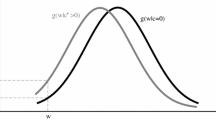Abstract
We model growth in dictatorships facing each period an endogenous probability of “political catastrophe'' that would extinguish the regime's wealth extraction ability. Domestic capital exhibits a bifurcation point determining economic growth or shrinkage. With low initial domestic capital the dictator plunders the country's resources and the economy shrinks. With high initial domestic capital the economy eventually grows faster than is socially optimal.
Similar content being viewed by others
References
Alesina, A., Ozler, S., Roubini, N., & Swagel, P. (1996). Political instability and economic growth. Journal of Economic Growth, 1(June), 189–212.
Almeida, H., & Ferreira, D. (2002). Democracy and the variability of economic performance. Economics and Politics, 14(3), 225–257.
Azariadis, C., & Drazen, A. (1990). Threshold externalities in economic development. Quarterly Review of Economics, 105(2), 501–526.
Bardhan, P. (1997). Corruption and development: A review of issues. Journal of Economic Literature, 35(3), 1320–1346.
Barro, R. (1991). Economic growth in a cross section of countries. Quarterly Journal of Economics, 106(2), 407–443.
Barro, R. (1996a). Democracy and growth. Journal of Economic Growth 1 (March), 1–27.
Barro, R. (1996b). Getting It Right. Cambridge, MA: MIT Press.
Bertocchi, G., & Spagat, M. (2001). The politics of co-optation. Journal of Comparative Economics, 29(4), 591–607.
Campos, J., & Root, H. (1996). The Key to the Asian Miracle. Washington D.C.: Brookings.
Clague, C., Keefer, P., Knack, S., & Olson, M. (1996). Property and contract rights in autocracies and democracies. Journal of Economic Growth, 1(June), 243–276.
De Long, J. B. (1997). Slouching Towards Utopia?: The Economic History of the Twentieth Century. http://www.j-bradford-delong.net/TCEH/Slouch_Old.html.
Gomez, E. T., & Jomo, K. S. (1999). Malaysia's Political Economy: Politics, Patronage and Profits. Cambridge: Cambridge University Press.
Lau, L. J., & Kim, J. I. (1994). The sources of economic growth of the East Asian newly industrialized countries. Journal of the Japanese and International Economies, 8(3), 235–271.
Londregan, J. B., & Poole, K. T. (1990). Poverty, the coup trap and the seizure of executive power. World Politics, 42(2), 151–183.
Marcouiller, D., & Young, L. (1995). The black hole of graft: The predatory state and the informal economy. American Economic Review, 85(3), 630–46.
McCaskie, T. C. (2003). Recent history. In Africa South of the Sahara 2003, 32nd edition, 447–450. London: Europa Publications.
McGuire, M., & Olson, M. (1996). The economics of autocracy and majority rule. Journal of Economic Literature, 34(1), 72–96.
Munting, R. (1982). The Economic Development of the USSR. New York: St. Martins Press.
Murphy, K., Shleifer, A., & Vishny, R. (1989). Industrialization and the big push. Journal of Political Economy, 97(5), 1003–1026.
Olson, M. (1963). Rapid growth as a destabilizing force. Journal of Economic History, 23(4), 529–552.
Olson, M. (1991). Autocracy, democracy and prosperity. In Zeckhauser, R. (Ed.), Strategy and Choice, 131–157. Cambridge, MA: MIT Press.
Olson, M. (1993). Dictatorship, democracy, and development. American Political Science Review, 87(3), 567–575.
Olson, M. (2000). Power and Prosperity. New York: Basic Books.
Przeworski, A., & Limongi, F. (1997). Modernization: Theories and facts. World Politics, 49(January), 155–183.
Przeworski, A., Alvarez, M., Ceibub, J., & Limongi, F. (1996). What makes democracies endure? Journal of Democracy, 7(1), 39–55.
Rake, A. (2003). Recent history. In Africa South of the Sahara 2003, 32nd edition, 1113–1116. London: Europa Publications.
Roberts, B., & Rodriguez, A. (1997). Economic growth under a self-interested central planner and transition to a market economy. Journal of Comparative Economics, 24(2), 121–139.
Robinson, J. (1997). When is a State Predatory? Unpublished manuscript.
Sachs, J., & Warner, A. (1995). Economic reform and the process of global integration. Brookings Papers on Economic Activity, 1995(1), 1–95.
Sah, R. (1991). Fallibility in human organizations and political systems. Journal of Economic Perspectives, 5(2), 67–88.
Skidmore, T. E., & Smith, P. H. (1997). Modern Latin America. Oxford: Oxford University Press.
Temple, J. (2003). Growing into trouble: Indonesia after 1996. In D. Rodrik (Ed.), In Search of Prosperity: Analytic Narratives on Economic Growth, 152–183. Princeton: Princeton University Press.
Wintrobe, R. (1990). The tinpot and the totalitarian: An economic theory of dictatorship. American Political Science Review, 84(3), 849–872.
Wintrobe, R. (1998). The Political Economy of Dictatorship. Cambridge: Cambridge University Press.
World Bank (1993). The East Asian Miracle. Oxford: Oxford University Press.
Young, A. (1995) The tyranny of numbers: Confronting the statistical realities of the East Asian growth experience. Quarterly Journal of Economics, 110(3), 641–680.
Author information
Authors and Affiliations
Corresponding author
Additional information
1Present affiliation unknown
Rights and permissions
About this article
Cite this article
Overland, J., Simons, K.L. & Spagat, M. Political instability and growth in dictatorships. Public Choice 125, 445–470 (2005). https://doi.org/10.1007/s11127-005-3060-0
Accepted:
Issue Date:
DOI: https://doi.org/10.1007/s11127-005-3060-0




